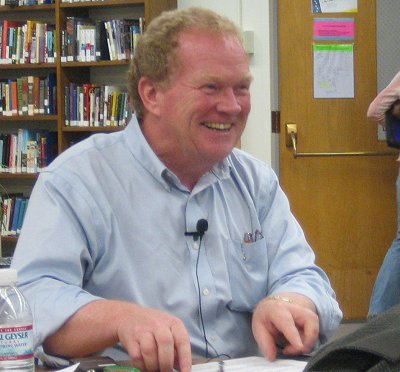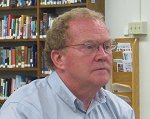- By Dan Veaner
- News
 Print
Print  aescayuga_plant120.jpgIn the last Lansing Board of Education meeting Superintendent Stephen Grimm told the school board about a Payment In Lieu Of Taxes (PILOT) program that could bring $300,000 new dollars to the school district every year starting next year. The agreement was negotiated with AES Cayuga, the Lansing electrical power plant. Tompkins County Administrator Stephen Wicher headed up a negotiating team that included legislators Martha Robinson, Michael Koplinka-Loehr, Dooley Kiefer, and Paula Younger. Last Monday Whicher came to the school board meeting to answer questions about the agreement.
aescayuga_plant120.jpgIn the last Lansing Board of Education meeting Superintendent Stephen Grimm told the school board about a Payment In Lieu Of Taxes (PILOT) program that could bring $300,000 new dollars to the school district every year starting next year. The agreement was negotiated with AES Cayuga, the Lansing electrical power plant. Tompkins County Administrator Stephen Wicher headed up a negotiating team that included legislators Martha Robinson, Michael Koplinka-Loehr, Dooley Kiefer, and Paula Younger. Last Monday Whicher came to the school board meeting to answer questions about the agreement."At the last meeting we talked about the AES Cayuga power plant," Grimm explained. "The county was in negotiations with the power plant about the assessed value of their property and business. They came to an agreement, a Payment In Lieu Of Taxes (PILOT) agreement that increases their assessed value over time. It benefits the district in that we will receive more money from them as a revenue source."
The agreement was negotiated in response to the power plant needing stability in its financial obligations for planning and reporting to its parent company, AES Corporation. The Lansing plant is coal based, with coal being delivered by railroad to the lakefront plant. The greatest uncertainty the plant faces is the impact of a growing focus on global warming and the carbon footprint of plants that produce electricity from coal.

County Administrator Stephen Whicher
The solution was a PILOT agreement, which increases the plant's taxable value from $142,000,000 today to $255,000,000 by 2013. That will mean more income for all the municipalities effected, including the Town of Lansing, Lansing Fire District, Tompkins County, and the Lansing Central School District. It will not affect the Lansing Community Library budget because it has a fixed levy dollar amount, but it will reduce the amount residents pay.
Because of the uncertainties of the market, the agreement can be reopened after two, five, ten, and fifteen years, which means the school district can not count on the added dollars as a certainty. But by using the unforeseen money to build up the district's capital reserves, school officials say it will help a long term program of small projects over the course of years.
That was especially fortuitous in terms of a discussion of an upcoming EXCEL project the district plans. The approximately one million dollar project will be almost entirely paid for by state aid, but the local share would come to about $280,000. Grimm was adamant on Monday that the project be put up for a vote with zero tax impact to the voters, meaning that the money would come from a $500,000 capital reserve.
"It's good timing," Grimm said. "We find out we have this $500,000 capital reserve. We can spend some of that. But we're going to get some more from them. So it's all happening at the right time."
 aescayuga_whicher150.jpgThe PILOT's Pilot aescayuga_whicher150.jpgThe PILOT's PilotTompkins County Administrator Stephen Whicher was at Monday's Lansing Board Of Education meeting to answer questions about the PILOT agreement between the County and AES Cayuga, and how it will impact the school district. Although the agreement can be renegotiated over its 15 year life, if it remains the same it will bring a new $300,000 to the school district every year, compounded from year to year. Here is a transcript from Monday's meeting: Stephen Wicher: You really have an outstanding corporate citizen in AES Cayuga. I've been on the negotiations dealing with our assessment parcels for many, many years when I was the assessor, and before that when I worked for the office of Real Property Services. It's rare that you sit across the table from someone who is really concentrating on what is good for the community as well as what is good for themselves. It was quite a pleasure. They are really fine people and a fine corporation. Glenn Cobb: Do you feel that the target assessment in 2013 is reasonable? Stephen Wicher: Yes, there's a benchmark number that goes by megawatts. It's roughly $20,000 per megawatt. That's what we were trying to achieve. Each party had their own things they were trying to achieve in the negotiation, but what I wanted to see come out of the overall agreement was that we would end up at at least $20,000 per megawatt. This is a 305 megawatt plant, and we did achieve that. When negotiations go well nobody's happy, but nobody's sad. They were tough negotiations and there were difficult times, but when we got all through everybody shook hands and said, 'That's fair.' It increases their tax payments to all the municipalities including the County by 10% per year. I think it's quite favorable for us. It gives AES Cayuga what they really needed, which was predictability and stability. That was the most important thing that they were looking for. David Dittman: Was this part of the negotiation as far as the acquisition of AES by another company? Stephen Wicher: No. What you are referencing is NYSEG. That is for the transportation of the electricity. This is the generating plant. AES was purchased about ten or twelve years ago. When I was the Assessor we negotiated essentially the same deal, the principal being that you try to get an agreement for a five year period which is about as predictable as you can predict in this environment. Glenn Cobb: Was the assessment of $20,000 per megawatt something that you analyzed and trended across the nation? Stephen Wicher: Actually it's built on all of the PILOT agreements in New York State. Glenn Cobb: Does this just cover the power plant property? Stephen Wicher: It covers the power plant property and I think it's 100 adjacent acres. Glenn Cobb: Right, the old Bell site. It includes that site as well? Stephen Wicher: Correct. The assessment will be split out -- I think it's $1.4 million and $1.5 million will be on the land. The remainder will be on the plant. Steve Grimm: What does this do for the lay person? Stephen Wicher: Bottom line, the school district will see an increase in tax payments by AES Cayuga of approximately $300,000 per year, compounded. Every year it will be increasing by $300,000. Keep in mind that we would advise that you be really careful of this, because at the end of the second year we have a reopener. No one in the world understands what this whole business of trying to address the carbon footprint of the plant is going to mean. It's impossible to know. The first auction was September 9th. I don't think we have a clear indication there. The next one is in January. I know that some people are saying it will be a minor amount -- I'm just going to pick numbers. If we're predicting a dollar here, it's 35 in Europe. The range is so ridiculous that you can't wrap your arms around it. What that really means is there is a tremendous amount of risk in these first two years. After that we'll have a better feel for it. Either party can reopen the negotiations at the end of the second year. The negotiations are automatically reopened after the fifth, tenth and fifteenth year. The principal we were working on from the County perspective was that no settlement could be based on a fixed dollar amount. It had to be on a ad valorem basis. That was our biggest sticking point at the beginning. AES had come forward and successfully negotiated with other municipalities to get a fixed dollar amount over a 20 year period. When that was brought to me I told them that I would not even take that to the Legislature. In Tompkins County we base everything on an ad valorem basis and we will not do anything else. There were some tough times there, but we got through that. I was just listening to your discussion of your capital issues. If you're talking about an ongoing smaller capital program as opposed to spending ten or fifteen million dollars at a pop this is perfect. This is the kind of money that's put away for those kinds of things as they come up. That way you're not depending on it for the levy every year. It's not going to impact your programs. When the money is there, it's there. When it's not there it's not there. Stephen Grimm: Next year is when we would have that first infusion. Stephen Wicher: Correct. In fact next year should cover that entire shortfall that you have. You were looking for $258,000. You have $500,000 in capital reserves. This is another $300,000 you could put into capital reserve or just apply to the program. You could reduce your borrowing and be in pretty good shape. Stephen Grimm: It's good timing. We find out we have this $500,000 capital reserve. We can spend some of that. But we're going to get some more from them. So it's all happening at the right time. Stephen Wicher: From a County perspective it's always better to apply your cash to a capital program. Michael Cheatham: Is there a parallel with the railroad and the delivery of coal to the plant, in terms of the PILOT or taxes? Stephen Wicher: No, that's a regulated railroad, nd the assessment of that property is controlled by the office of Real Property Services. That's one of the risks that AES faces -- how much does coal cost and how much does it cost to transport it? It's a very difficult situation for them because there's only one way to get coal there. Glenn Swanson: Do we get revenue from the railroad property? Stephen Wicher: Yes. Glenn Swanson: With the price of lakefront property going up a lot, will that assessment go up? Stephen Wicher: That's one of the more difficult questions in Lansing, because many of the people who live along the lake consider that they own lakefront property. The railroad actually owns the lakefront. |
----
v4i37



